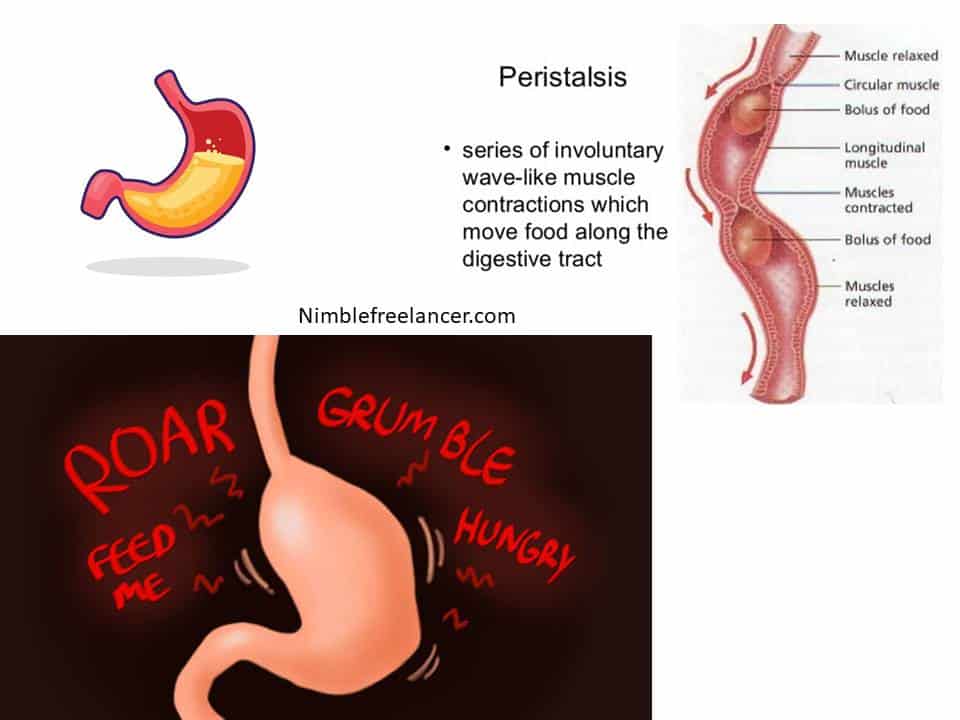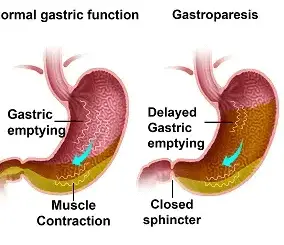A sloshing stomach can be uncomfortable and annoying, but it is also common after eating. Depending on what you eat, your stomach might start moving around and even cause a gurgling sound in your abdomen. Sloshing can also happen when you drink a large amount of food or carbonated drinks.
Your gurgling stomach can be annoying, but you shouldn’t worry too much about it. The gurgling is caused by your intestines moving food through your digestive tract. You’ll hear more gurgling when there isn’t much food in the tract, but it’s still perfectly normal.
The noises are usually so quiet that people around you cannot hear them. If your stomach is loud enough for others to hear, it could indicate overeating or swallowing air while eating. You may want to try eating smaller meals and chewing with your mouth closed to keep air from getting in.
Read further to learn the common questions regarding a sloshing stomach and why you should be concerned. Please read an article about Preventing Water Sloshing in the Stomach!
What Does A Sloshing Stomach Mean?
A sloshing stomach without pain is a typical sound during the peristalsis process. If you hear the liquid in your stomach, usually a rumbling sound after eating, your muscle walls contract to mix the food in your stomach that will later be digested.

While it’s often associated with hunger, a sloshing stomach can be caused by many things. It’s most common after eating when food is being digested. It can even happen when your stomach is empty, and you’re not hungry.
A sloshing stomach describes stomach sounds resembling water sloshing in a bucket or balloon. The medical term for a sloshing stomach is borborygmi (pronounced BOR buh rig mee) or “stomach rumbling.”
Stomach noises are expected, and there’s usually no need to worry about them. Sometimes, they can indicate a more severe condition like irritable bowel syndrome (IBS) or gastroesophageal reflux disease (GERD), but this is rare. A sloshing stomach usually means you’re hungry, but it could also tell you haven’t eaten enough fiber lately or that you just ate something that doesn’t agree with you.
Other causes of a sloshing stomach include:
- drinking carbonated drinks
- eating foods that can cause bloating, such as beans and lentils
- indigestion
- heartburn
- acid reflux
- stomach ulcers
- other gastrointestinal issues
Why Do I Hear Liquid Sloshing In My Stomach?
You hear the liquid sloshing in your stomach because your muscle walls contract when you mix the food. One of the most common causes is simply the intake of too much liquid—either through drinking or eating something mostly made up of water, like soup.

Another common reason is when you have a lot of gas trapped in your digestive system. Finally, medical conditions can cause fluid to accumulate in your abdomen, including ascites (fluid buildup caused by liver disease) and ovarian cancer.
Or you could have swallowed air. This is common for people who eat or drink quickly, chew gum, smoke, or wear loose dentures. Your body may also try to get rid of the air by burping.
If you are not eating or drinking, your stomach may make sounds because it’s moving digested food, liquids, and gas through your intestines. The intestines are lined with muscle that helps move food along as it gets broken down into nutrient particles that can be absorbed into the bloodstream. Even when you’re not eating, your intestines continue to contract and relax at certain times to keep this process going. These movements can cause sloshing and gurgling sounds in your stomach.
Dehydration can also make fluid in your intestines move more slowly, which increases the likelihood of sloshing noises from your stomach.
A common reason for hearing liquid in your stomach is a fluid buildup due to heart failure. When this happens, blood backs up in other body areas, including the stomach. As blood pools there, it causes swelling and increased fluid volume.
If you’re concerned about hearing liquid sloshing in your stomach, we recommend seeing a doctor for a diagnosis.
Why Can I Hear Liquid In My Stomach When I Move?
If you hear liquid in your stomach when you move, your stomach has likely accumulated too much fluid. When liquid sloshes around in an empty stomach attempting to digest food, your stomach will make a rumbling noise, also known as borborygmus, food.
Most of the time, this sound does not cause concern. Still, if it happens often or seems to be getting worse, it could be a sign of gastroesophageal reflux disease (GERD) or gastroparesis (a condition where food moves too slowly through your digestive system).

Additionally, it may be time to see your doctor if you experience other symptoms, such as heartburn or indigestion and the noise and discomfort in your abdomen.
Gastrointestinal problems can cause various symptoms, including abdominal pain and discomfort, nausea/vomiting, bloating, or gas buildup after eating certain foods like beans or broccoli.
One possible cause of feeling liquid in your stomach when you move is a hiatal hernia, a protrusion of the stomach into the chest through an opening in the diaphragm. This happens when the valve separating the esophagus from the stomach relaxes and allows food to flow back into the esophagus, creating a feeling of liquid sloshing around in your stomach.
To test if a hiatal hernia causes your symptoms, try standing up straight and bending over at a 45-degree angle. If this helps relieve your symptoms, it may indicate a hiatal hernia. If you are experiencing these symptoms that seem to worsen, it’s time to visit your doctor for more testing.
Is It Normal To Hear Water Sloshing In Your Stomach?
The short answer is that many people experience hearing water sloshing in their stomachs every day. The sweater is heard in the ear and stomach and may sound like bubbles or waves.
It is entirely normal to hear water sloshing in your stomach. It does not mean that your body cannot digest the water, nor does it mean you have too much water in your stomach.
Water sloshing around in your stomach is usually just the result of taking a drink of water (which you should often do; you should drink lots of water).
There are other causes of stomach rumblings, and they are usually related to food. If you eat foods that are hard to digest, like dairy or complex carbohydrates, your stomach will be noisy.
If you have a tub full of water, your stomach is empty, and your mouth is full of water, the noise you hear when you open the tap (without pouring the water) will be similar to the noise you hear when you are sloshing in your stomach.
If your stomach is empty and you have a full glass of water in front of you, the noise may be different, as it may sound like someone was trying to pour out a glass of water.
If there is only a tiny amount of liquid in your stomach and it is not incomplete, there will be no sound.
In addition, if there is food in your stomach, there will also be some sound coming from the food.
Why Does My Stomach Feel Like A Water Balloon?
There are many causes behind the feeling of a “water balloon” stomach. Still, the most common include constipation, irritable bowel syndrome (IBS), food intolerances, lactose intolerance, excess gas, and even stress. If you’re experiencing bloating or other discomforts in your stomach and want to know more about what’s causing it or how to treat it, talk to your doctor.
For instance, if your body is retaining water, that could be it. Your body keeps extra water for many reasons. If you’re dehydrated, for example, your body will hold onto whatever water it can find to protect itself from dehydration. Other things that might cause water retention include heat, high sodium consumption, and pregnancy.
Other causes of a swollen stomach could be bloating, caused by trapped or excess gas in the digestive tract. Bloating is most commonly caused by eating foods that are difficult to digest or are known to cause gas. It can also be caused by overeating, drinking carbonated beverages too quickly, talking while you eat, or chewing gum.
Suppose you suspect that neither bloating nor water retention is causing your stomach to feel like a balloon. In that case, you should seek a professional opinion from a doctor or other medical professional.
What Do You Do When Your Stomach Is Full Of Water?
People usually try to solve this problem by self-medicating with over-the-counter medications, but natural alternatives can be used to treat this condition. However, it would be much better to always seek professional help if your stomach is full of water; you feel bloated and uncomfortable. It can be challenging to eat or even drink when it feels like your stomach is full. Sometimes the e, the excess water will pass through your system, but there are other times when it may get stuck and cause you to feel nauseous.
If this happens to you, don’t panic! Many things could have caused your stomach to fill up with water, including overeating fiber at once or drinking too many carbonated beverages in one sitting. Here are some tips on what you can do when your tummy is full of water:
- Drink plenty of liquids—especially those that contain electrolytes like Gatorade or Powerade.
- Eat less food and more vegetables (especially green leafy ones). You may also want to cut back on dairy products such as milk, cheese, yogurt, etc. because they’re high in fat and take longer for the body to digest than carbohydrates, which go right through us quickly enough without causing bloating or gas pains!
- Take an antacid if necessary—this should help relieve any discomfort caused by excess gas in your stomach due to overeating fiber at one time!
If none of these measures work, seek professional help immediately.
How Do You Get Rid Of Water In Your Stomach?
To eliminate water in your stomach, you need to treat the underlying problem that caused it. You may drink a beverage like water, juice, or tea that causes you to urinate or defecate. That is how the body gets rid of excess water.
For example, if you drink too much alcohol, the best solution is to stay hydrated and drink lots of water.
If you have a medical condition such as congestive heart failure or liver failure, you must talk with your doctor about treating them so they do not cause water retention.
Some medications may help reduce symptoms associated with water retention during pregnancy (such as swelling) if you are pregnant or breastfeeding.
You may also want to consider taking over-the-counter diuretics. These can help flush out excess fluids from your system by increasing your urination frequency and volume.
Keep in mind that the stomach is not meant to hold water. If you feel like you have water in your stomach, your body will retain fluid.
This happens when the sodium-potassium balance in your blood is disrupted. Sodium and potassium are electrolytes that work together to regulate the amount of fluid inside and outside of cells. Too much sodium and no eninsufficientsium can cause fluid retention, leading to bloating, swelling, and weight gain.
Average fluid retention occurs during pregnancy and menstruation but can also happen for other reasons. It can also be a side effect of certain medications (like nonsteroidal anti-inflammatory drugs) or occur when someone has an underlying condition such as heart disease or kidney disease.
There are several things you can do to reduce the amount of excess water in your body:
- Eat more fruits and vegetables! They contain lots of potassium, which helps maintain a proper electrolyte balance within cells.
- Drink more water! This may sound strange initially, but drinking enough water helps prevent water retention by diluting fluids, so they don’t get concentrated with sodium.
- Reduce salt intake and avoid processed foods if possible (these tend to contain high amounts).
What Causes Sloshing Sound In Stomach?
You might experience a sloshing sound in your stomach for several reasons. Some reasons are benign, while others can indicate an underlying condition or disease.
A sloshing sound in the stomach is usually expected and mostly harmless. However, it can be a sign of a gastrointestinal disorder. A sloshing sound in the stomach is an indicator that there is excess fluid in the abdominal cavity. The extra fluid can make sloshing sounds as it moves around the abdomen.
Bloating, which occurs when excess air or gas gets trapped in the gastrointestinal tract, may also cause sloshing sounds in the stomach. It is often experienced after eating a large meal, gulping drinks too fast, or chewing gum. Bloating should disappear when the gas passes through the gastrointestinal tract and exits the body through burps and flatulence.
For your reference, here are some of the leading causes of sloshing noises in the stomach:
- Aerophagia is excessive swallowing (or air) that may be caused by anxiety or eating too quickly. It can be easily treated by learning to calm down before eating and slowing down while eating.
- Peristalsis: This is a medical term to describe the rippling, wave-like movements your digestive system uses to push food through the intestines. This is normal but can sometimes be loud enough to hear through the abdomen. Slowing down while eating can help reduce this noise.
- Borborygmi: These gurgling sounds occur when gas and fluids move through your intestines. They are typically associated with hunger and do not usually indicate severe health issues.
When Should I Be Worried About Stomach Noises?
Stomach noises are common, and most of the time, they are nothing to worry about. However, noises and other symptoms like bloating, indigestion, or abdominal pain may indicate a more severe problem.
The human body is a strange and beautiful thing. Most of us spend our lives getting to know its many quirks, from the summer-rain smell of our armpits to the involuntary muscle twitches we experience falling asleep at night.
But one part of our bodies often goes ignored until it starts making noises—our stomachs. While many people have similar experiences with stomach growls and gurgles, not everyone understands what these noises mean.
The most common causes of stomach noises range from harmless to severe:
- Gurgling stomachs can be caused by anything from indigestion to intestinal blockage. If you experience these sounds alongside abdominal cramping, diarrhea, or constipation, they could mean that you have a severe bacterial infection called C. difficile.
- Rumbling in the stomach is commonly associated with hunger pangs, but the movement of gas or fluid can also cause it through the intestines. If you have a rumbling stomach accompanied by appetite loss and weight loss over time, you may have cancer.
- High-pitched squealing sounds in your stomach are usually not a cause for concern—they’re often just the result of air passing through your digestive system or gastric juices squirting around in your gut—but if you hear these noises regularly, they may indicate something more serious.
Gurgling stomachs are the most common one. It just means that your body requires food! This can happen when you’ve gone for an extended period without eating (more than four hours), but it can also occur if you haven’t eaten enough food for a meal or if you ate lots of high-fiber foods that left your body feeling hungry for more (thanks, legumes). The best way to avoid this situation is to eat regular meals throughout the day, but if you can’t do that, try snacking occasionally.
What Are The Symptoms Of a Gurgling Stomach?
The symptoms of a gurgling stomach will vary depending on the cause. However, one of the most common symptoms is a rumbling or growling sound from your belly.
Contractions cause this in the muscles lining the stomach wall, which helps to push your food through your digestive system. These sounds are usually more noticeable when your stomach is empty and can be heard about 10 to 20 minutes after eating.
Although these noises are embarrassing, they’re normal and harmless. They only become a problem if they disrupt your daily routine.
However, there are other symptoms that you should also be looking out for. Some of the most common symptoms include:
- Pain in your abdomen
- Nausea
- Vomiting
- Diarrhea
- Constipation
- Bloating/gas
If you have had a gurgling stomach and any of these symptoms for more than two days, you must contact your doctor.
Conclusion
A gurgling stomach can be severe, but you don’t have to worry about it.
Sometim,epeoplele may think a gurgling stomach is something to worry about. But that’s not the case. There are many types of gurgling stomachs, some requiring treatment and others not.
Sometimes, a gurgling stomach is a normal part of digestion. This type of gurgling stomach is usually not something you need to worry about; if you’re experiencing it, it’s likely because you’ve just eaten or are in the middle of a meal. Other times, however, a gurgling stomach can indicate an underlying digestive disorder or your body isn’t getting the nutrients it needs. If this happens frequently—more than twice per month—you should talk to your doctor about what might be causing the issue.
- Facebook Ads to Get Followers! - December 27, 2024
- ClickUp vs. Slack - December 20, 2024
- Mastering E-Commerce Analytics: A Blueprint for Success






